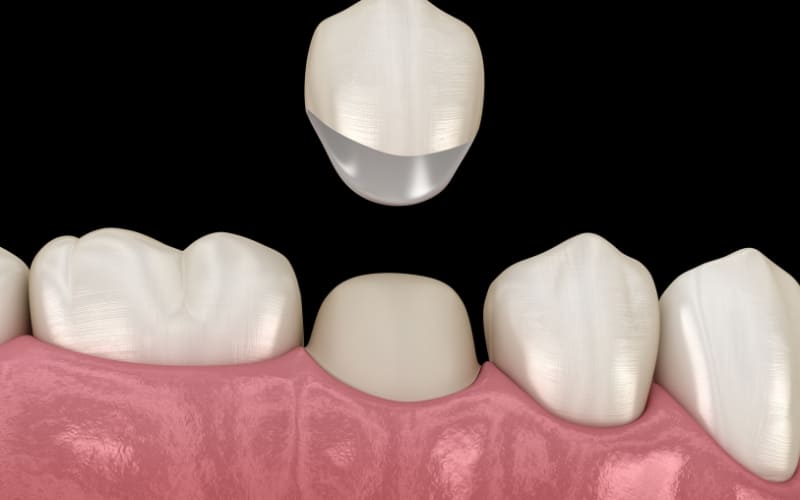Introduction
A bright, confident smile is often considered a sign of good health and well-being. However, maintaining that radiant smile might require more than brushing and flossing. Dental problems, such as a fractured tooth or a cavity, can detract from the appearance of your teeth while also causing discomfort or agony. In such cases, a dental crown procedure can be the solution to restore your smile and dental health.
One of the most common questions people have regarding this surgery is if it will be painful. In this article, we will explore the world of dental crowns the procedure itself, and address the all-important question: Does the dental crown procedure hurt?
Understanding Dental Crowns
Before diving into the potential pain of a dental crown procedure, let’s begin by understanding what dental crowns are and why they are necessary. Dental crowns are custom-made coverings that are attached to a tooth that is decaying or broken.
They serve a dual purpose: to protect the tooth from further damage and to improve its appearance. Crowns are typically used when a tooth has a large cavity, is cracked, broken, or has undergone a root canal treatment.
These crowns are designed to resemble your natural teeth, so they blend seamlessly into your smile. Depending on the patient’s specific needs and aesthetic preferences, they can be made from various materials, including porcelain, metal, or a combination of both.
Types of Dental Crowns
Different kinds of dental crowns are available, and each has benefits and drawbacks. The most common types include:
1. Porcelain Crowns:
These crowns are known for their natural appearance, making them a popular choice for visible teeth. They are highly durable and stain-resistant, providing a long-lasting solution for restoring your smile.
2. Metal Crowns:
Metal crowns, often made of alloys like gold or silver, are extremely strong and durable. They are less likely to chip or break, making them suitable for teeth that endure heavy chewing forces.
3. Porcelain-Fused-to-Metal (PFM) Crowns:
PFM crowns blend the natural porcelain appearance with the strength of metal. They are a versatile option that works well for both front and back teeth.
4. Zirconia Crowns:
These crowns have a reputation for being robust and long-lasting. They are an excellent choice for molars and premolars requiring extra chewing support.
The choice of crown type depends on the tooth’s location, the patient’s specific needs, and their cosmetic preferences. Your dentist will help you decide which type of crown is best for your situation.
The Dental Crown Procedure
Usually, the dental crown process entails the following steps:
1. Initial Consultation:
The process begins with an initial consultation with your dentist, during which they will evaluate your dental health, take X-rays, and discuss the treatment plan with you.
2. Tooth Preparation:
To ensure the crown fits properly, the affected tooth is reshaped. This may involve removing a portion of the tooth’s structure.
3. Impressions:
After the tooth has been prepared, impressions are taken to create a custom-made crown that will fit perfectly over the tooth.
4. Temporary Crown:
A temporary crown is affixed to safeguard the prepared tooth while the permanent crown is being made.
5. Fitting the Permanent Crown:
Your dentist will remove the temporary crown and use dental cement to bond the permanent crown in place when it is ready.
6. Adjustments and Final Polishing:
Any necessary adjustments are made to ensure that the crown fits comfortably and does not affect your bite. The crown is then polished to match the color and shine of your natural teeth.
Does the Procedure Hurt?
Let’s address the burning question: does the dental crown procedure hurt? The truth is that the system itself is generally not painful. Before the process begins, your dentist will administer a local anesthetic to numb the area.
This ensures you will not feel any pain or discomfort during the tooth preparation and crown placement. You may, however, experience some pressure or slight discomfort as the dentist works on your tooth, but it should not be painful.
It’s worth noting that you may feel some mild discomfort or sensitivity as the anesthesia wears off after the procedure. This is entirely normal and can usually be managed with over-the-counter pain relievers. If you experience any severe pain or prolonged discomfort, it’s important to contact your dentist, as it could be a sign of an issue that needs to be addressed.
Tips to Manage the Discomfort
If you’re concerned about post-procedure discomfort or want to be prepared for any potential pain, consider these tips to manage the discomfort:
1. Take Pain Medication:
Over-the-counter pain relievers like ibuprofen or acetaminophen can help alleviate any mild discomfort. Be sure to follow your dentist’s recommendations or the instructions on the medication label.
2. Avoid Hard or Hot Foods:
Stick to softer foods and avoid extremely hot or cold items to prevent exacerbating sensitivity.
3. Maintain Good Oral Hygiene:
Continue to brush and floss your teeth as usual, but be gentle around the crowned tooth to prevent irritation.
4. Use Toothpaste for Sensitive Teeth:
A toothpaste designed for sensitive teeth can help reduce any discomfort or sensitivity you may experience.
5. Follow Your Dentist’s Advice:
Your dentist will provide specific post-procedure care instructions. Follow these recommendations carefully to ensure a smooth recovery.
Final Words!
In conclusion, the dental crown procedure is not typically painful due to the administration of local anesthesia. While you may experience some pressure or mild discomfort during the process, it should not be a cause for concern.
Post-procedure discomfort is usually manageable with over-the-counter pain relievers and should subside within a few days.
Dental crowns play a crucial role in restoring the function and aesthetics of your teeth, ensuring that you can continue to enjoy a healthy, confident smile. If you need a dental crown procedure or have any concerns about your oral health, it’s essential to consult with a qualified dentist.
Excel Dental is your trusted partner in achieving optimal dental health and a radiant smile in Missouri City. With their expertise and commitment to patient comfort, you can rest assured that your dental crown procedure will be as painless as possible, leaving you with a smile to be proud of.
So, don’t let concerns about pain keep you from getting treatment. Contact Missouri City Dentist – Excel Dental for professional and compassionate dental care.
You can also read our latest article on Different Types Of Dentures.


